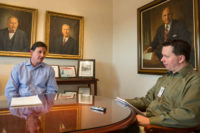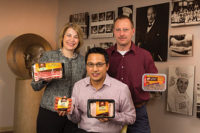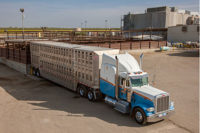When Oscar Mayer began consulting with Dr. Kurt Vogel, assistant professor of livestock welfare and behavior at the University of Wisconsin-River Falls (UWRF), on animal care and welfare initiatives a couple years ago, little did anyone know where the road would ultimately lead for the two parties.
By the time the journey developed into a formal partnership in 2013, plans were under way for an unprecedented collaboration, but few expected the groundswell of innovation that would come early on.
Today, Oscar Mayer and UWRF have raised expectations of what formal collaboration between industry and academia can accomplish — having put the duo on the brink of a possible mini revolution revolving around the way in which processors perform animal-welfare audits.
Dr. Lauren Sammel, senior associate principal scientist, and Dr. Tim Knight, associate principal scientist for Oscar Mayer, have led the initiative on the processor side. Sammel has been a serious proponent of industry-academia collaboration throughout her career and saw this as a fit almost immediately.
“On the research side, sometimes there are gaps in between both sides,” she explains. “So this was just a perfect place to create a partnership that would be a win-win for both Oscar Mayer and UW-River Falls, as well as a win for the industry at large.”
Knight shares similar thoughts on how this type of setup can further animal-welfare knowledge.
“We realized early on that the education of the next generation of animal-welfare scientists was going to be very critical,” he says. “We wanted students to not only get their education at the university in animal welfare, but also see what happens in the industry environment with animal welfare.”
As such, Oscar Mayer began to offer a 12-week animal-welfare internship to a UWRF student as part of its commitment to the partnership. Consider, for a moment, the stereotypical business-world internship of filing papers, making follow-up phone calls and doing general grunt work that none of the full-time workers wants to do. For Oscar Mayer’s interns, there would be no “getting coffee for the boss” — that was certain.
“[We wanted] to give them real projects, something that was concrete,” Knight explains. “We wanted to give them leadership roles that would grow them as leaders in animal welfare, with projects that had real innovation and could contribute to animal welfare in a real way, and we’ve been able to do that very successfully.”
Brooke Bartz was the first UWRF student awarded the internship, and she served two successive “terms”, predominantly working out of Oscar Mayer’s Newberry, S.C., turkey-processing facility between January and July 2014.
“Brooke has a tremendous amount of animal-welfare skill and knowledge,” Knight says. “We brought Brooke in, [and] went to the turkey slaughter plant in Newberry. We took her through everything from the birds entering the plant on the truck, to a finished product going out the door, … [and] she got to do ride-alongs with technicians, whose job is to go around and visit turkey farms, to get her some on-farm experience.”
Once Bartz was given the tour of the turkey operations and some further education about turkeys, the Oscar Mayer animal-welfare team sat down with her to determine what her internship project would entail. Knight says Bartz developed a plan to create a more robust, user-friendly turkey-welfare auditing process.
“She started pulling it all together and then said, ‘We need to make this easier, model it after a Temple Grandin-style audit, where we’re actually looking at and recording every single bird, so that there is a permanent record,’” Knight adds. “Then we started talking about taking it to an electronic audit where the record-keeping would be downloaded to a central location and used as a metric for ongoing, continuous assessments.”
Bartz found an app called iAuditor online. She then used the app to create a custom audit for turkey welfare, put it into a mobile format and has been using it at the plant to do the turkey-welfare audits since. At presstime, Oscar Mayer was transitioning use of the app to Newberry’s full-time auditors, now that Bartz has beta-tested it.
“More recently, I’ve been working on getting the questions weighted correctly, so that it mirrors a paper audit more closely,” Bartz says. “But everything from the initial documentation, to signing the document to make it official, to confidentiality statements can be done electronically.”
Simply put, the electronic project has taken animal-welfare documentation to the next level, Sammel says.
“The audit is a prime example of how this partnership has benefitted all of us,” she says. “To have an audit that is electronic and user-friendly is fantastic, and we can now take the insights we’re getting about turkey welfare at our Newberry plant and talk to our suppliers about welfare with tangible data.”
The industry as a whole stands to benefit as well — the company expects to make the electronic audit available to other processors in the near future.
“Our plan is to take the audit to industry groups first, so that we know we’re putting out a good program, and share the animal-welfare information with the industry in a non-competitive way — using food safety as our model,” Knight explains. “We want to formally make this audit a resource that anybody in industry can pick up and use,…or modify to fit their specific needs.”
Bartz has set the bar high for the next interns to follow, but Oscar Mayer will continue to challenge future interns, knowing that UWRF and Vogel will have them well-prepared. After just six months of hosting an animal-welfare intern, Oscar Mayer appears to have gotten a fantastic return on its investment already.
The university level
A partnership is not a one-way street, and the collaboration between the UWRF animal-science department and Oscar Mayer is no different.
No one understands this better than Vogel, who studied under Dr. Temple Grandin at Colorado State and has been teaching at UWRF for three and a half years. In fact, his words burst with passion for his craft when he discusses just what the partnership allows UWRF to offer its students.
“Frankly, it’s meant a lot: It’s been a springboard that has given me the opportunity to do what I’m passionate about,” Vogel says. “I love to teach, and it’s hard to find support for people who love to teach — [this partnership] is unprecedented, and it has given me the resources I need in order to benefit the students, which is what really matters to me.”
The three-year agreement calls for $125,000 in funding from Oscar Mayer to UWRF to advance the school’s animal-welfare offerings to students. Dr. Gary Onan, professor and chair of the Department of Animal and Food Science at UWRF, says the financial support can help in a variety of ways, from creating undergraduate research opportunities to giving faculty members more time to do research work themselves.
“It really addresses very directly two of our overall goals of distinctive academic excellence, creating a program in animal welfare that is unparalleled anywhere in the world,” Onan explains. Additionally, the funding will allow expansion of the animal-welfare coursework. Currently, UWRF offers only an introductory-level class on animal welfare that Vogel teaches.
“With Oscar Mayer’s support, we now have the ability to build additional classes, ones that also put to use the lab equipment, of which Oscar Mayer contributed a significant amount as well,” Vogel states. “We’re developing the courses to give our students more of an opportunity to learn what it really takes to understand animal welfare — that there’s more to it than simply activist groups and diet choices.
“The classes will help them to understand animal welfare to a great depth,” he adds. The first new class is planned for the fall semester, and Vogel says it will be called Quantitative Animal Welfare Assessment.
“The focus will be to find ways to put numbers on indicators of animal well-being, and to help students understand that we cannot rely on one variable alone to assess animal welfare,” he explains. “We need to take a battery of variables to get a broad sense of what the animal’s welfare state is.”
Vogel adds that the class will consist of a fair amount of lab work, taking students from the UWRF Teaching Farm (photos above) to the lab, analyzing blood and other samples to get data and assess animal welfare.
“We’ll be trying to tie behavior and physiology together in that class,” he says. The third class is expected to be more focused on students who are interested in food animal management, teaching them more hands-on animal-welfare activities and strategies on the Teaching Farm that they can take into the workforce.
In addition to the classes, Oscar Mayer’s funding allows for the creation and maintenance of a consumer-facing animal-welfare online resource — a central location for all animal-welfare knowledge that consumers and industry stakeholders could reference as an unbiased source of information.
“It’s something further down the line, but it’s a resource people can rely on to get more information on how to assess animal welfare,” Vogel says. “The focus will not be so much on making people feel good as it will be on providing the information needed to really get their heads wrapped around what welfare really is and how we should approach it.”
Earlier this year, Vogel was named the Kraft/Oscar Mayer Faculty Scholar of Livestock Welfare and Behavior. His approach to animal welfare has been well-documented in the pages of a variety of trade and research journals, and his teaching strategies and goals follow suit. He believes the way to achieve proper education of the next-generation of animal-welfare stakeholders must involve hands-on instruction, as that’s how he learned best.
“We teach them concept and theory in the lecture hall, but we’ve got to be ready to make the transition to putting their hands on the process, because that helps cement the ideas,” he says. “That way, when they’re out in the field someday handling the animals, it all comes back to them. … That’s the way we have to be teaching our students.”
The UWRF/Oscar Mayer partnership appears to be a perfect match in that aspect, giving students a platform from which they can exert influence in a growing segment of industry operations, helping the industry take a step forward in improving and communicating its efforts in animal welfare.








